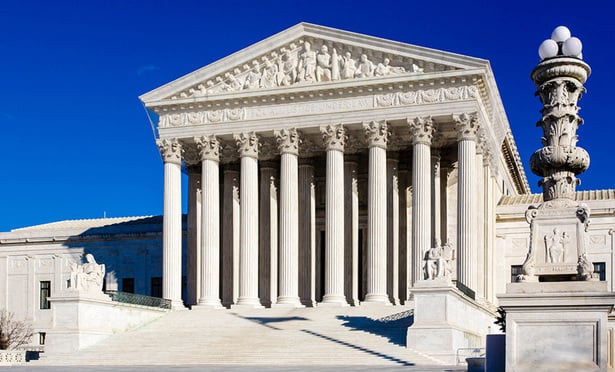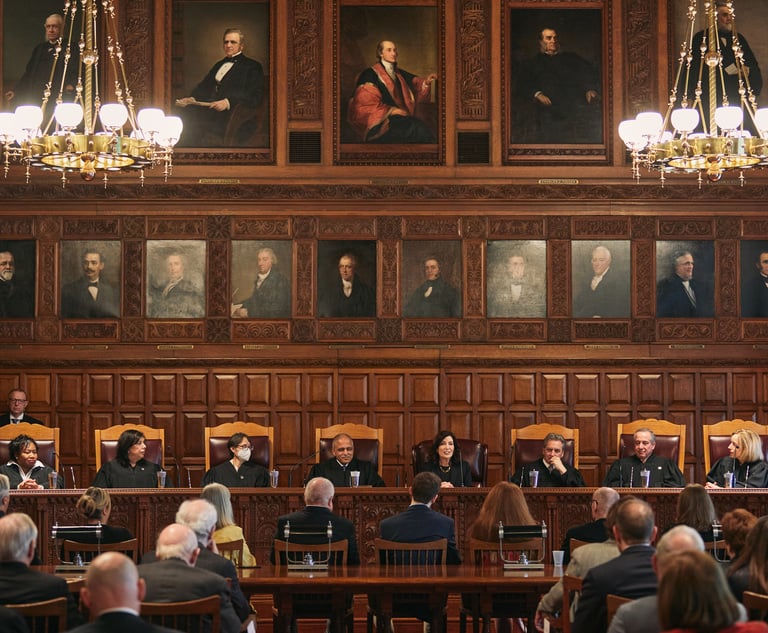'DHS v. City and State of New York': SCOTUS Doesn't Trust the Court System
The Supreme Court must curb its early intervention in immigration cases if it wants to preserve its reputation as an independent branch of government.
February 03, 2020 at 11:00 AM
5 minute read
 U.S. Supreme Court
U.S. Supreme Court
On Jan. 27, 2017, a federal court in New York issued the first emergency order forbidding federal agents at JFK Airport from putting the travel ban into effect and deporting Hameed Khalid Darweesh, an Iraqi who had just arrived on the special immigrant visa he received for assisting U.S. troops in Iraq. This week, exactly three years later, on Jan. 27, 2020, the Supreme Court went out of its way to chastise another federal court in New York.
The court issued a three-sentence order granting the Department of Homeland Security's petition for a stay of the preliminary injunction against the new Trump Administration "public charge" regulation dramatically expanding the government's power to deny benefits to immigrants. Last fall, after considering the arguments presented by the City and State of New York and those presented by DHS, Judge George Daniels, S.D.N.Y., ruled that the City and State of New York (and others) were likely to prevail on their arguments that the new regulation was procedurally and substantively defective. Accordingly, as is normal practice, Judge Daniels ruled that, as a preliminary matter, the new rule should not go into effect while the lawsuit is proceeding. The status quo, the "public charge" interpretation in use for more than 20 years, would remain in effect. If DHS prevails on the merits, the new "public charge" interpretation would go into effect. If the City and State of New York prevail, the preliminary injunction would become permanent.
This week the Supreme Court overturned the normal way of proceeding. In its three sentences, the Supreme Court gave no hint of what Judge Daniels had gotten wrong in his careful and thorough opinion. Whatever its unarticulated rationale, it may be the Supreme Court is right. Federal trial judges do sometimes reach incorrect conclusions. That's why there are federal appellate courts, to review and correct any mistakes, which they generally do with the benefit of a fully developed record.
What is extraordinary about today's ruling is that the Supreme Court has reached out again, as it did in the Hawaii v. Trump travel ban litigation, to tell one of the many federal trial judges in the United States that one of the many interim rulings is incorrect. The Supreme Court was not content to rely on the regular appellate process, but decided it had to step in, bypassing the Second Circuit, to suspend the preliminary ruling while the litigation continues. This unusual step has become the new normal. The Trump administration has sought at least 20 stays of lower court decisions in three years; in the preceding 16 years, the Obama and Bush Administration sought fewer than 10 similar stays. The current Supreme Court has been receptive to requests that it intervene before the litigation has fully developed the issues.
Some say that the Supreme Court's heightened activity in supervising ongoing trial court litigation is due to a recent surge in the number of federal trial courts that have issued preliminary nationwide injunctions while newly proposed nationwide federal rules are litigated. Certainly, Justice Neil Gorsuch's concurring opinion laments what he characterizes as a proliferation of broad preliminary injunctions. Even if there are more nationwide injunctions than in the past (and there are challenges to this characterization), why should the Supreme Court oversee each of these preliminary rulings? If federal trial courts are running amok by issuing inappropriate nationwide injunctions, the federal appellate courts are available to overturn them. Indeed, Justice Gorsuch points out that the Ninth Circuit and the Fourth Circuit Courts of Appeal reviewed preliminary decisions about the "public charge" rule and concluded that preliminary injunctions against the expanded "public charge" rule were not appropriate. The U.S. Court of Appeals for the Second Circuit announced on Jan. 8 an expedited schedule to review the preliminary injunction at issue. The Supreme Court could not wait. And once it jumped into the fray, it did not take the time to explain its thinking or to advise other federal courts which portion of the trial court's analysis was flawed.
A reversal by the Supreme Court is not unusual. What is unusual is the increasing frequency of requests by the government for the Supreme Court to intervene at early stages of litigation. What is unusual is a Supreme Court that hurries to undermine cases in preliminary proceedings before they are fully developed and briefed. What is unusual is a Supreme Court that distrusts the norms of the federal appellate review system.
What is becoming more usual, however, is the Supreme Court's haste to greenlight restrictive changes to longstanding immigration practices and programs before allowing full consideration of their legality and impact. The Supreme Court must curb its early intervention in immigration cases if it wants to preserve its reputation as an independent branch of government.
Maryellen Fullerton is Suzanne J. and Norman Miles Professor of Law at Brooklyn Law School. She is an expert on asylum and refugee law.
This content has been archived. It is available through our partners, LexisNexis® and Bloomberg Law.
To view this content, please continue to their sites.
Not a Lexis Subscriber?
Subscribe Now
Not a Bloomberg Law Subscriber?
Subscribe Now
NOT FOR REPRINT
© 2025 ALM Global, LLC, All Rights Reserved. Request academic re-use from www.copyright.com. All other uses, submit a request to [email protected]. For more information visit Asset & Logo Licensing.
You Might Like
View All
Jimmy Carter’s 1974 Law Day Speech: A Call for Lawyers to Do the Public Good
14 minute readTrending Stories
Who Got The Work
Michael G. Bongiorno, Andrew Scott Dulberg and Elizabeth E. Driscoll from Wilmer Cutler Pickering Hale and Dorr have stepped in to represent Symbotic Inc., an A.I.-enabled technology platform that focuses on increasing supply chain efficiency, and other defendants in a pending shareholder derivative lawsuit. The case, filed Oct. 2 in Massachusetts District Court by the Brown Law Firm on behalf of Stephen Austen, accuses certain officers and directors of misleading investors in regard to Symbotic's potential for margin growth by failing to disclose that the company was not equipped to timely deploy its systems or manage expenses through project delays. The case, assigned to U.S. District Judge Nathaniel M. Gorton, is 1:24-cv-12522, Austen v. Cohen et al.
Who Got The Work
Edmund Polubinski and Marie Killmond of Davis Polk & Wardwell have entered appearances for data platform software development company MongoDB and other defendants in a pending shareholder derivative lawsuit. The action, filed Oct. 7 in New York Southern District Court by the Brown Law Firm, accuses the company's directors and/or officers of falsely expressing confidence in the company’s restructuring of its sales incentive plan and downplaying the severity of decreases in its upfront commitments. The case is 1:24-cv-07594, Roy v. Ittycheria et al.
Who Got The Work
Amy O. Bruchs and Kurt F. Ellison of Michael Best & Friedrich have entered appearances for Epic Systems Corp. in a pending employment discrimination lawsuit. The suit was filed Sept. 7 in Wisconsin Western District Court by Levine Eisberner LLC and Siri & Glimstad on behalf of a project manager who claims that he was wrongfully terminated after applying for a religious exemption to the defendant's COVID-19 vaccine mandate. The case, assigned to U.S. Magistrate Judge Anita Marie Boor, is 3:24-cv-00630, Secker, Nathan v. Epic Systems Corporation.
Who Got The Work
David X. Sullivan, Thomas J. Finn and Gregory A. Hall from McCarter & English have entered appearances for Sunrun Installation Services in a pending civil rights lawsuit. The complaint was filed Sept. 4 in Connecticut District Court by attorney Robert M. Berke on behalf of former employee George Edward Steins, who was arrested and charged with employing an unregistered home improvement salesperson. The complaint alleges that had Sunrun informed the Connecticut Department of Consumer Protection that the plaintiff's employment had ended in 2017 and that he no longer held Sunrun's home improvement contractor license, he would not have been hit with charges, which were dismissed in May 2024. The case, assigned to U.S. District Judge Jeffrey A. Meyer, is 3:24-cv-01423, Steins v. Sunrun, Inc. et al.
Who Got The Work
Greenberg Traurig shareholder Joshua L. Raskin has entered an appearance for boohoo.com UK Ltd. in a pending patent infringement lawsuit. The suit, filed Sept. 3 in Texas Eastern District Court by Rozier Hardt McDonough on behalf of Alto Dynamics, asserts five patents related to an online shopping platform. The case, assigned to U.S. District Judge Rodney Gilstrap, is 2:24-cv-00719, Alto Dynamics, LLC v. boohoo.com UK Limited.
Featured Firms
Law Offices of Gary Martin Hays & Associates, P.C.
(470) 294-1674
Law Offices of Mark E. Salomone
(857) 444-6468
Smith & Hassler
(713) 739-1250









